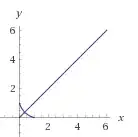How many solutions are there for $x^x=y^y$? I believe they are uncountable, but what is the proof? I have an example stating that $\frac{1}{2}^{\frac{1}{2}}=\frac{1}{4}^{\frac{1}{4}}$. What other examples and proofs of this are there?
-
2Have you sketched a graph of the function? – Mark Bennet Mar 05 '18 at 22:42
-
This might be relevant – kingW3 Mar 05 '18 at 23:12
5 Answers
The function $x^x$ has a single global minimum at $x = \frac{1}{e}$. You will notice that it is strictly decreasing from $x = 0$ to $x = \frac{1}{e}$ and strictly increasing from $x = \frac{1}{e}$ to infinity.
Moreover it is continuous, so you can use the Intermediate Value Theorem to deduce how many times the function can take on certain values.
- 4,445
We must restrict to $\mathbb R^+$ for the exponentiations to make sense.
The function $x^x$ is decreasing from $(0,1)$ to $(e^{-1},e^{-e^{-1}})$ then increasing and crosses $y=1$ again at $x=1$.
Thus the equation $z=x^x$ as two solutions in $x$ for $x\in [0,1]$ (except at $e^{-1}$) and a single one elsewhere.
One of the solutions is obviously $x=y$. The other (when it exists), requires the use of the Lambert function and is given by
$$x=e^{W(y\ln y)}$$ (second branch).
(1) $x^x=y^y$
(2) $x^{x*1/x}=y^y$
(3) $x^1=y^{y/x}$
Now if x,y is an integer (doesn't really matter, but I've stated it just in case) x=y, x$\ne$0. Then the statement is true for all cases of x,y. Since
$x=y^{1}$ for all x=y
Actually anther way to understand this is to just set x=y for (3)
- 13
It amounts to solving $$x\log x=y\log y.$$ Observe the function $f(x)=x\log x$ is defined o, $(0,+\infty)$, $f'(x)=1+\log x$, hence decreases from the limit value of $0$ to the value $-\dfrac1{\mathrm{e}}$ on the interval $\Bigl(0,\dfrac1{\mathrm e}\Bigr)$ the increases from $-\dfrac1{\mathrm{e}}$ to $+\infty$ if $x \ge \dfrac1{\mathrm{e}}$. On this interval, the value $0$ is attained at $1$, so the restriction of $f$ to the interval $\Bigl[\dfrac1{\mathrm e},1\Bigr)$ is an increasing bijection from this interval onto $\Bigl[-\dfrac1{\mathrm e},0\Bigr)$.
We may conclude that for any $x\in\Bigl(0,\dfrac1{\mathrm e}\Bigr)$ there exists another (unique) $y\in\Bigl(\dfrac1{\mathrm e},1\Bigr)$ such that $$x\log x=y\log y.$$
- 175,478
The example is one solution.
What about $x = \frac12,$ $y = \frac12$? Is that a solution too? Why or why not?
Can you come up with any other solutions? For how many values of $x$ can you find a solution?
- 98,388
-
I thought we liked the Socratic method on this site, but perhaps it's only favored in comments ... – David K Mar 06 '18 at 01:25
